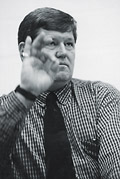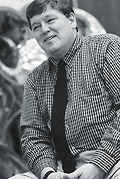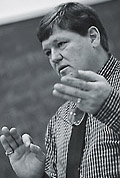|
|
Gregory Bimm: “We are constantly searching for new ideas. We are
always listening.” Catholic New World photos by David V. Kamba
Marian Catholic marching forth as champions
The Interview, a regular feature of The Catholic New World, is an in-depth conversation
with a person whose words, actions or ideas affect today’s Catholic.
It may be affirming of faith or confrontational. But it will always
be stimulating.
This week, Catholic New World staff writer Michael D. Wamble talks
with Gregory Bimm.
Past the clarinets at play and around the corner from the dueling
French horns, a girl races down the hall, skipping over bookbags
and snapping shots on a disposable camera.
“Just running out the roll,” she says, smiling brightly.
And that’s all it is … for now.
In those four long years known as high school, it can be hard
to hold on to the ever-changing present.
Actors call that gift of seizing the day “being in the moment.”
For the past 24 years at Marian Catholic High School, Gregory
Bimm, the school’s band director, has remained in the moment.
Leading the Woodwind Choir through Samuel Barber’s “Adagio for
Strings,” the moody piece used as the musical theme for the film
“Platoon,” Bimm is surrounded by pieces of times gone by.
High above duct-taped sousaphones, the red, white and blue Band
of America national trophies from last year and from six previous
years line the choral room.
Since 1980, Marian Catholic has won consecutive Illinois championships
in their class.
But Bimm doesn’t blow his own trumpet, though it was his first
instrument.
Growing up in Wynaet, a tiny town in central Illinois, Bimm learned
the trumpet from his dad Charles. Bimm’s father had been tutored
by his grandfather. “That’s what the guys in my family did,” he
said.
So when the chance to perform Jan. 20 in President Bush’s inaugural
parade, that’s what the band did.
They were the only Illinois band in the entire ceremony. And the
only Catholic one.
It was a unique moment the sousaphones and band members shared
with the nation.
Those memories will remain as time marches on.
The Catholic New World: How did the band’s invitation to the inaugural
come about?
Gregory Bimm: I got a phone call from the office of U.S. Rep. Jesse Jackson
Jr. last November. He asked if we would be interested in applying
for the parade. So I checked the feasibility and got right back
to him to say “yes.”
The application material was supposed to go through the week after
the election. The groups that perform are selected by the Presidential
Inauguration Committee, a body formed right after we know who
the new president is. So five weeks later than we thought, the
committee was set.
TCNW: Did the elongation of the presidential contest delay your
preparation?
GB: Yes. Our 260 band members had been released for Christmas vacation.
We had a phone tree set up since we were awaiting word and passed
the message to start working on parade music.
When we got back to school in January, we had nine rehearsals
in two weeks, which coincided with semester exams to get ready
for the inauguration.
TCNW: We had an unusual election this year.
GB: Yeah, it was. Actually, it made it a little more exciting since
we were pressed into service.
TCNW: The inauguration was scheduled close to the annual March
for Life in Washington. Were you in town for that event?
GB: We missed it by a day.
In truth, I didn’t know about the march before we went out there.
It was only when we attended Mass at the beautiful Basilica [of
the National Shrine of the Immaculate Conception] and loaded the
bus up to come home that I found out about it.
Its timing probably would have caused us not to be able to stay.
We are very sensitive about how much school we miss.
TCNW: How did you come to the congressman’s attention last November?
GB: I don’t know. Maybe he or one of his staff members might have
seen in a paper that we had won the Bands of America National
Championship. We’ve won seven national championships.
TCNW: Have you grown accustomed to winning?
GB: No. The level of competition is really high. There are about
90 bands in competition. It’s very much like a skating competition
in that there is nothing that is really objective.
In a football game, the bottom line is the team that scores the
most wins.
In skating, you can’t measure it the same way. There are judges,
who according to their opinion, like someone better than someone
else.
There are objective things they can look for, but it is still
subjective.
TCNW: Does it come down to the music you select? How do you go
about making those selections?
GB: We are constantly searching for new ideas. We are always listening.
One of the great blessings of today is Amazon.com. You can listen
to samples of music to find the right material that lends itself
to our students’ educational experience, as well as lending itself
to a visual presentation.
TCNW: Would you ever select that mellow piece of music, like the
composition you rehearsed with the Woodwind Choir for the marching
band?
GB: No, but a couple of other bands have used Samuel Barber.
The marching band performances that you see in a contest are not
necessarily all about glitz and glamour. We really do two kinds
of shows.
At a home football game you want the music to be loud and cheerful
to keep the crowd involved. At a marching band contest, in truth,
people view it much more as an art form.
So you’re as likely to hear “Adagio for Strings” as an up-tempo
jazz piece.
If you play something that’s too “artsy” at a home game it gets
lost in the moment. The crowd is there to cheer. But when you’re
at the contest, people are there to see what type of artistic
expression you have created.
Top
Front Page | Digest | Cardinal | Interview
Classifieds | About Us | Write Us | Subscribe | Advertise
Archive | Catholic Sites | New World Publications | Católico | Directory | Site Map
|
|









